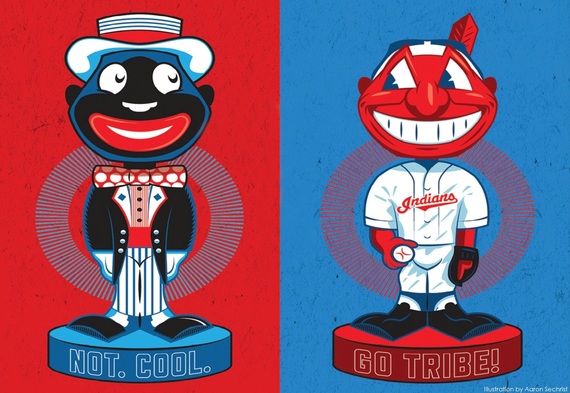
By Kevin Gover, Director of the Smithsonian National Museum of the American Indian. This post first appeared on indiancountrytodaymedianetwork.com in October 2014.
The Organization of American Historians, the nation's leading organization of scholars of U.S. history, just approved a resolution demanding the change of the name and logo of the Washington "Redskins." The petition was introduced on behalf of James Loewen, the sociologist and historian who wrote the book Lies My Teacher Told Me. Loewen details the reasons he wanted the organization to take this stand in his statement titled, "Why Historians Should Demand the Redskins Change Their Name."
Beneath the debate over the name of the Washington NFL football team is an underlying truth: the vast majority of Americans have a limited -- and often mistaken -- understanding of Native American history. Indeed, as people learn of the origins and history of the mascot, approval of the team's name quickly fades. The lack of understanding is readily explained. There are 566 federally recognized American Indian tribal governments in the United States. Yet, most Americans -- even those occupying our economic and political centers -- do not encounter Native Americans in their day-to-day lives. Perceptions are reduced to myths and caricatures and to the limited education retained from the American classroom.
At best, Americans learn a few stories: Squanto and the Pilgrims, Pocahontas, the Cherokee Trail of Tears, and the Battle of the Little Bighorn are standard fare. Little is learned of King Philip's War, the Pueblo Revolt, the ethnic cleansing of the South and Midwest, or the genocide of California Indians, all more historically significant than the tales Americans are taught.
In the nation's capital, the consequences of that lack of understanding are most damaging. Consider the laws based on false notions of Native American history. In 1955, Justice Stanley Reed, speaking for the Supreme Court, observed that "Every American schoolboy knows that the savage tribes of this continent were deprived of their ancestral ranges by force and that... it was not a sale, but the conqueror's will that deprived them of their land." Thus the Court ruled that land belonging to Indians in Alaska from time immemorial could be taken from them by the United States without compensation. In a sense, Justice Reed was correct. Every American schoolboy did know those things. But every American schoolboy was wrong. If a true, fulsome and inclusive American history is not taught in schools, how can anyone expect U.S. lawmakers to elevate contemporary law and policy?
A single museum cannot create systemic change. But it can seed understanding and incite conversation that spurs change. The single greatest contribution of a history museum, notes Mike Wallace of the City University of New York, could be in "helping visitors develop their historical sensibilities, strengthening their ability to locate themselves in time, and enhancing their capacity as citizens to be historically informed makers of history."
In this regard, the Smithsonian Institution's National Museum of the American Indian has an important role to play--one we are taking on with greater focus and intensity. The museum, which is well known for its treatment of Indian cultures, now recognizes a calling to help correct the misperceptions and fill the vacuum of knowledge regarding the history of the United States and Native Nations. We are embarking on a new effort through a number of exhibitions such as "Nation to Nation: Treaties Between the United States and American Indian Nations" to inform and engage the public, policymakers, and policy influencers across the country. Simultaneously, we will accelerate efforts to work with educators, providing classroom materials designed to instill a richer understanding of our history as Americans.
The controversy surrounding the Washington football team name is in some ways a bellwether. Americans do not know enough about our shared history even to be properly offended at the lack of an inclusive narrative that illuminates the history of this continent in all of its complexity. Museums occupy an important function in contributing to a well-informed citizenry. The National Museum of the American Indian gladly accepts this role.
Kevin Gover, director of the Smithsonian Institution's National Museum of the American Indian, is a Citizen of the Pawnee Nation of Oklahoma.
Follow National Museum of the American Indian on Twitter: http://twitter.com/SmithsonianNMAI
